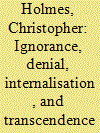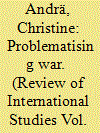|
|
|
Sort Order |
|
|
|
Items / Page
|
|
|
|
|
|
|
| Srl | Item |
| 1 |
ID:
120465


|
|
|
|
|
| Publication |
2013.
|
| Summary/Abstract |
In this article, I suggest what an engagement between post-structuralism and the work of Karl Polanyi might look like. I do this by presenting a reading of Polanyi's concept of 'double movement' as a form of problematisation through binary opposition. I suggest that the central opposition that the double movement depicts - between economy and society as reflected in processes of marketisation and social protection - presents itself in such a way that the problems emanating from the opposition can only be solved through its transcendence. On one hand, the terms of transcendence are limited by the terms of the opposition. On the other hand, since transcendence is never reached, the double movement problematisation stabilises the existence of a lacuna between the lived experience of market society and the discursive field of that market society. As such, the form of the problematisation places a double-limit upon the ways in which 'solutions' can be presented. I present this thesis in relation to two instances of double movement discussed by Polanyi in his book, The Great Transformation. I then apply the argument to invocations of the economy-society opposition in contemporary political economic discourse, where it remains as ubiquitous as ever.
|
|
|
|
|
|
|
|
|
|
|
|
|
|
|
|
| 2 |
ID:
187034


|
|
|
|
|
| Summary/Abstract |
This article redirects extant critiques of the modern problem of war at this problem's underlying logic of deviance. According to this logic, war constitutes a kind of international conduct that contravenes behavioural norms and that can be corrected through diagnostic and didactic means. Thereby, war is rendered into a problem falling within the scope of human agency. However, this agency rests on and reproduces this logic's constitutive blind spots. Therefore, it seems imperative to develop ways of problematising war otherwise. The article provides two starting points for (critical) IR scholarship seeking to undertake such a project. Firstly, it combines two Foucaultian tools, the concept of problematisation and the method of genealogy, to direct critique at the logics underlying our evaluative – analytical, ethical, and political – judgements. Secondly, it uses these tools to trace the contingent emergence of the logic of deviance in a crucial example within the wider genealogy of the problem of war: the Carnegie Endowment's commission of inquiry into the Balkan Wars of 1912 and 1913. Based on original archival research, I highlight different elements of this inquiry's problematisation of war – its frames, assumptions, ways of knowing, and subjects of knowledge – to make them available for reconstruction.
|
|
|
|
|
|
|
|
|
|
|
|
|
|
|
|
|
|
|
|
|